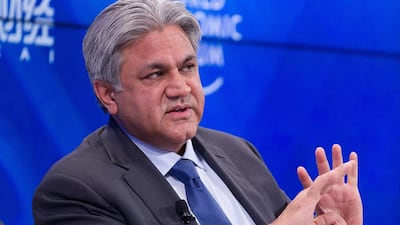Abraaj Group, the private equity company in Dubai roiled by allegations of misusing funds, met key stakeholders and creditors on Monday to discuss the potential sale of its investment management business and the ongoing restructuring of the troubled company.
The private meeting included "shareholders, lenders and other invited parties, interested in the restructuring of Abraaj Holdings specifically, and other group entities more generally", the company said.
The purpose of the meeting was “to maintain a constructive dialogue with the group’s creditors and make further orderly progress, in the interests of all stakeholders, towards a consensual resolution of all outstanding issues”, Abraaj said.
A spokesman for the company declined to identify meeting participants, but said all the group creditors were attending. Senior management, including the group's chief executive Arif Naqvi and the company's advisers, updated stakeholders on the progress of discussions with potential buyers of the Abraaj Investment Management business, according to the company statement.
Sale of the funds management business along with the company’s stakes in various companies, such as Pakistani Utility K-electric, are among the measures which would help resolve potential liquidity problems, Abraaj told creditors in an earlier meeting, according to a Bloomberg report.
Colony NorthStar, however, ended talks to buy a majority stake in Abraaj's fund-management unit after its due diligence efforts raised concerns about the company, Bloomberg reported, citing sources. Cerberus Capital Management is still in discussions and is carrying out its own due diligence.
The Middle East's biggest buyout company, which at its peak had more than $13.6 billion (Dh49.96bn) of assets under management, is reeling from allegations of misusing funds in a healthcare investment vehicle that deployed capital from investors including the Bill & Melinda Gates Foundation, the World Bank's International Finance Corporation, Britain's CDC Group and Proparco Group of France.
The Wall Street Journal and The New York Times in February claimed some of the 24 investors in the $1bn Abraaj Growth Markets Health Fund (AGHF) had hired forensic accountants to investigate what had happened to some of the money invested in the fund.
__________
Read more:
Abraaj's Naqvi relinquishes control of funds business in major organisational shakeup
Abraaj says KPMG review finds no evidence of fund misuse
Abraaj denies misappropriating healthcare funds
__________
Abraaj at the time dismissed the reports as “inaccurate and misleading” and said unused capital in AGHF was returned in December following discussions with investors.
On February 8, the company said that a KPMG review of the company’s health fund found no misuse of funds and all payments and receipts were in order. The accounting firm however was later said to have carried out an internal review into its audits, according to a Bloomberg report in May.
The allegations of misuse have snowballed and the company founded by Mr Naqvi in 2002 is now reorganising its structure. It has subsequently returned capital in a new global fund, and has delayed an initial public offering or sale of its North African hospitals business, and pared about 15 per cent of its total workforce.
As part of the reorganisation efforts, Mr Naqvi ceded control of the fund management unit in February and the company decided to temporarily suspend deployment of capital, other than on transactions for which commitments are already final, it said at the time without specifying how long the suspension will remain.
Abraaj on Monday said it would discuss “ongoing transactions and other matters” at the meeting with stakeholders, without specifying the agenda.
The company owes about $1bn in debt to creditors, according to a Reuters report.
Dubai’s Mashreq, Noor, Commercial Bank of Dubai and French lender Societe Generale are among the major creditors of the company, with Mashreq having the biggest exposure, according to media reports.
Houlihan Lokey is advising Abraaj on its debt and the sale of its investment management business. The co-chief executives of the investment management unit, Omar Lodhi and Selcuk Yorgancioglu, are also attending the meeting to provide their perspectives on the current status of the process, Abraaj said.


